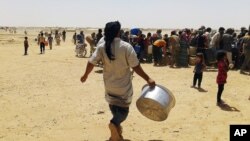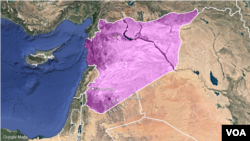The United Nations welcomed the resumption of food deliveries to some of the tens of thousands of Syrians massed along the desert border with northeastern Jordan who have had little access to aid since the Jordanian government closed the border in June.
U.N. humanitarian chief Stephen O'Brien said food and other items were distributed Tuesday in the Rukban area as part of what is planned to be two weeks of deliveries and healthcare services.
The U.N. estimates there are 85,000 people living in the remote area. A year ago, that number was about 12,000.
Jordan was an early welcoming destination for refugees looking to get away from the civil war in Syria that broke out in March 2011, with the country of 8 million people taking in more than 650,000 refugees. But a car bombing that killed six soldiers in July in Rukban brought the closure of the border and declarations that no new refugee camps would be built.
In August, the World Food Program got around the border closure by using a crane to hoist food from the Jordanian side to the Syrians.
The new deliveries come as the region prepares for the beginning of the winter season. Aid group Doctors Without Borders warned Tuesday that the humanitarian situation around Rukban is expected to worsen given the living conditions.
"Syrians living in flimsy, makeshift tents that cannot withstand the strong winds of winter will be forced to face even more challenges simply to survive," the group said in a statement.
It identified a lack of proper winter clothing, hot water, electricity and firewood as major challenges facing the Syrians.
U.N. figures show 4.8 million registered Syrian refugees, about 500,000 more than there were at this time last year. Turkey hosts the largest population at 2.7 million, followed by Lebanon, Jordan, Iraq and Egypt. Another 6 million people are displace within Syria.
International efforts to bring a peaceful conclusion to the complicated Syrian conflict have made little progress.






